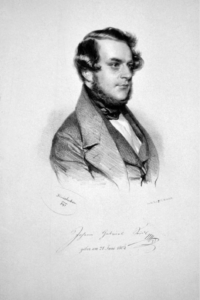The distinction, or Maggie's obedience
(Poet's title: Die Unterscheidung, oder: Gretchens Gehorsam)
Set by Schubert:
D 866/1
[probably summer 1828]
Part of Vier Refrain Lieder, D 866
Die Mutter hat mich jüngst gescholten
Und vor der Liebe streng gewarnt.
“Noch jede”, sprach sie, “hat’s entgolten:
Verloren ist, wen sie umgarnt!”
Drum ist es besser, wie ich meine,
Wenn keins von uns davon mehr spricht;
Ich bin zwar immer noch die Deine,
Doch lieben, Hans! kann ich dich nicht!
Vor allem, Hans, vergiss mir nimmer,
Dass du nur mich zu lieben hast.
Mein Lächeln sei dir Lust nur immer
Und jeder andern Lächeln Last!
Ja, um der Mutter nachzugeben,
Will ich mich, treu der Doppelpflicht,
Dir zu gefallen stets bestreben,
Doch lieben, Hans! kann ich dich nicht!
Bei jedem Feste, das wir haben,
Soll’s meine größte Wonne sein,
Flicht deine Hand des Frühlings Gaben
Zum Schmucke mir in’s Mieder ein.
Beginnt der Tanz, dann ist, wie billig,
Ein Tanz mit Gretchen deine Pflicht;
Selbst eifersüchtig werden will ich,
Doch lieben, Hans! kann ich dich nicht!
Und sinkt der Abend kühl hernieder,
Und ruhn wir dann, recht mild bewegt,
Halt immer mir die Hand an’s Mieder,
Und fühle, wie mein Herzchen schlägt!
Und willst du mich durch Küsse lehren,
Was stumm dein Auge zu mir spricht,
Selbst das will ich dir nicht verwehren,
Doch lieben, Hans! kann ich dich nicht!
My mother recently told me off
And gave me a strong warning against love:
“All women,” she said, “have paid the price:
Anyone ensnared by love is lost!” –
Therefore it is better, in my opinion,
If none of us ever speaks of it again!
I am definitely still yours for ever:
But, Hans, I cannot love you!
Above all, Hans, never forget me,
That it is only me that you love;
May my smile always delight you,
And may the smiles of anyone else be a burden to you.
Yes, in order to make concessions to my mother,
True to my double duty I shall
Always attempt to please you:
But, Hans, I cannot love you!
At every festival that we have
It will be my greatest pleasure
If your hand were to offer the gifts of spring and attach them
As decoration to my bodice.
When the dance begins, then, as is expected,
It is your duty to have a dance with Maggie;
I shall become jealous of myself:
But, Hans, I cannot love you!
And when the cool evening falls,
And we then rest, gently stirred as we should be,
Keep your hand on my bodice
And feel my little heart beating.
And if you would like to teach me through kissing
What your eyes are telling me in silence,
Even that is something I shall not forbid you:
But, Hans, I cannot love you!
All translations into English that appear on this website, unless otherwise stated, are by Malcolm Wren. You are free to use them on condition that you acknowledge Malcolm Wren as the translator and schubertsong.uk as the source. Unless otherwise stated, the comments and essays that appear after the texts and translations are by Malcolm Wren and are © Copyright.
☙
Themes and images in this text:
Clothes Dancing Evening and the setting sun Eyes Flowers Hands Hearts Jealousy Kissing Mother and child Noise and silence Spring (season)
What precisely is the ‘distinction’ that this girl is making? Is it to do with the difference between Hans and other boys (even though her mother seems to think that all men are the same)? Is it primarily to do with the social difference between Hans and the speaker (Gretchen), which means they will never be allowed to marry each other? Or is it to do with the difference between ‘love’ as a socially approved relationship and a private feeling?
Although she loves him, she cannot ‘love’ him. Although she cannot (= she is not permitted to) love him, she clearly cannot stop herself from loving him. The whole ‘joke’ depends on these ambiguities. The result is that the repeated line at the end of each stanza becomes more ironic with each repetition. In the end, the final word (‘nicht’) might as well not exist.
☙
Original Spelling Die Unterscheidung Die Mutter hat mich jüngst gescholten, Und vor der Liebe streng gewarnt: "Noch jede", sprach sie, "hat's entgolten: Verloren ist, wen sie umgarnt!" - Drum ist es besser, wie ich meine, Wenn kein's von uns davon mehr spricht! Ich bin zwar immer noch die Deine: Doch lieben - Hans! kann ich dich nicht! Vor Allem, Hans, vergiß mir nimmer, Daß du nur mich zu lieben hast; Mein Lächeln sei dir Lust nur immer, Und jeder Andern Lächeln - Last. Ja, um der Mutter nachzugeben, Will ich mich, treu der Doppelpflicht, Dir zu gefallen stets bestreben: Doch lieben, Hans - kann ich dich nicht! Bei jedem Feste, das wir haben, Soll's meine größte Wonne sein, Flicht deine Hand des Frühlings Gaben Zum Schmucke mir in's Mieder ein. Beginnt der Tanz - dann ist - wie billig - Ein Tanz mit Gretchen deine Pflicht; Selbst eifersüchtig werden will ich: Doch lieben, Hans - kann ich dich nicht! Und sinkt der Abend kühl hernieder, Und ruh'n wir dann, recht mild bewegt, Halt' immer mir die Hand an's Mieder, Und fühle, wie mein Herzchen schlägt. Und willst du mich durch Küsse lehren, Was stumm dein Auge zu mir spricht, Selbst das will ich dir nicht verwehren: Doch lieben, Hans - kann ich dich nicht!
Confirmed by Peter Rastl with Das Veilchen. Ein Taschenbuch für Freunde einer gemüthlichen und erheiternden Lectüre. Achtzehnter Jahrgang. 1835. Wien, bey Heinrich Buchholz, k.k. Hof- und bürgl. Buchbinder, pages 43-44.
Note: Schubert received Seidl’s poem in handwritten form. Seidl issued it later in a revised form in the almanac mentioned above, but did not include it in his poetry editions.
To see an early edition of the text, go to page 43 [59 von 158] here: http://digital.onb.ac.at/OnbViewer/viewer.faces?doc=ABO_%2BZ162572008


